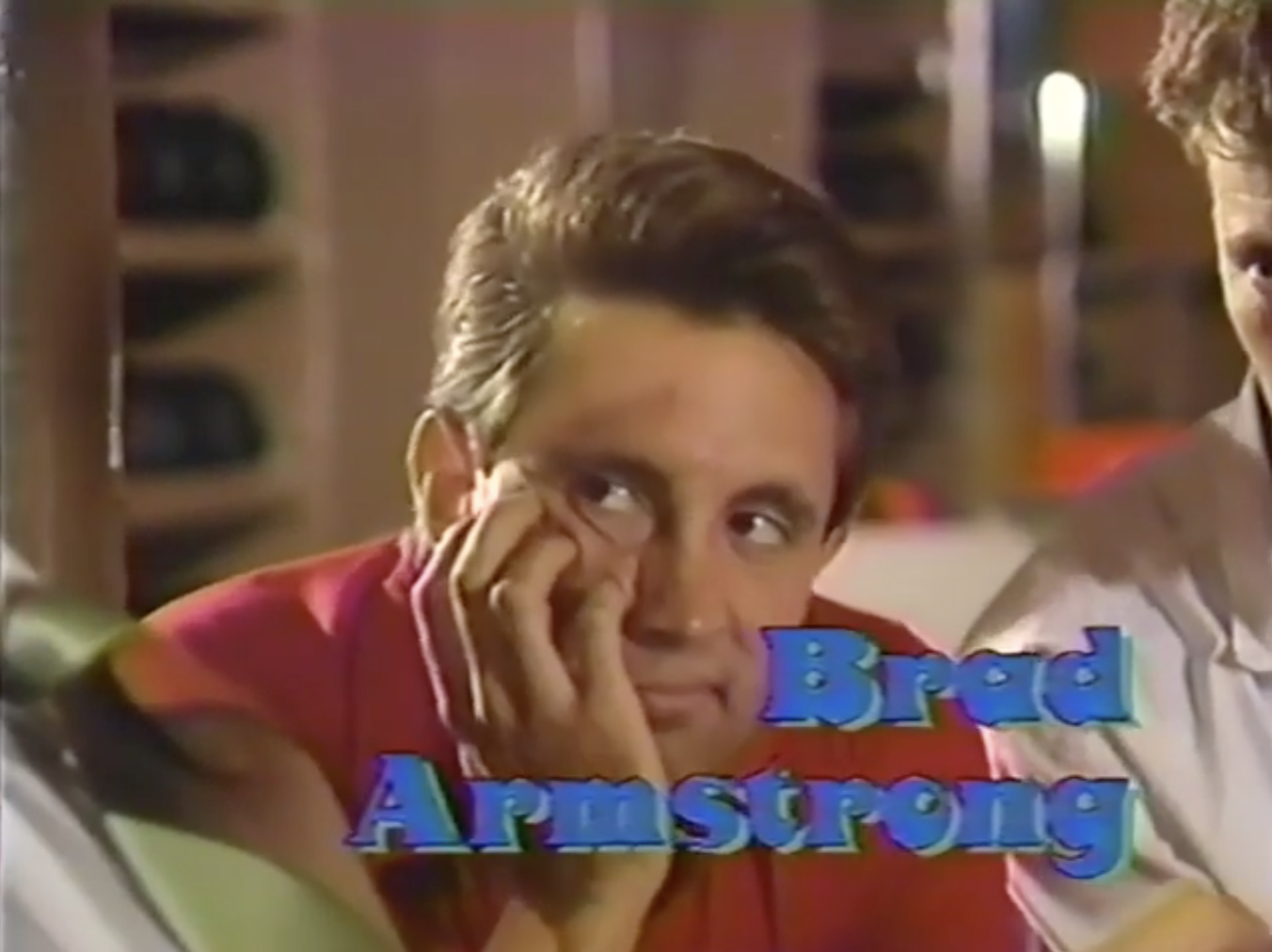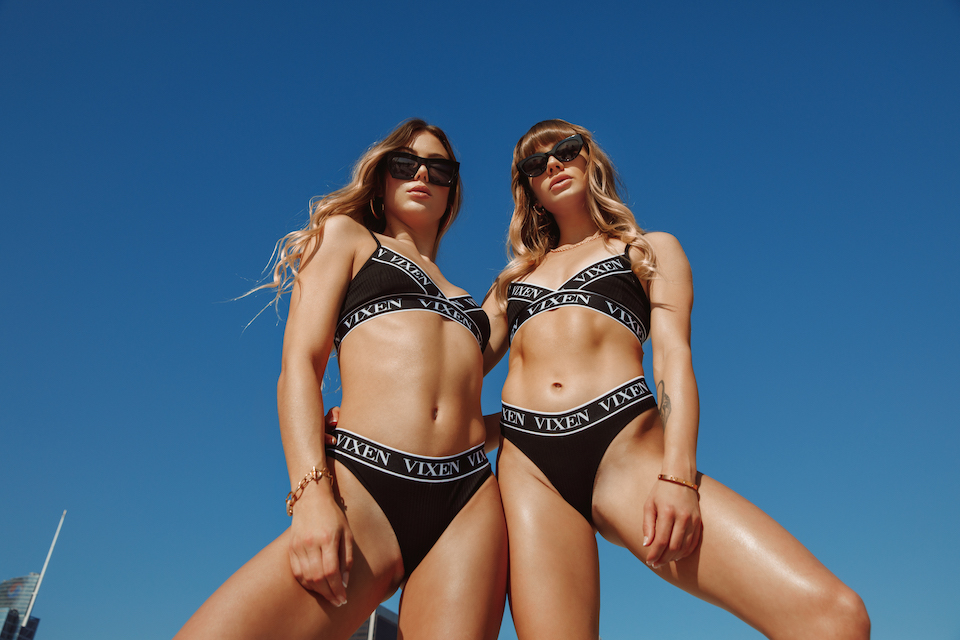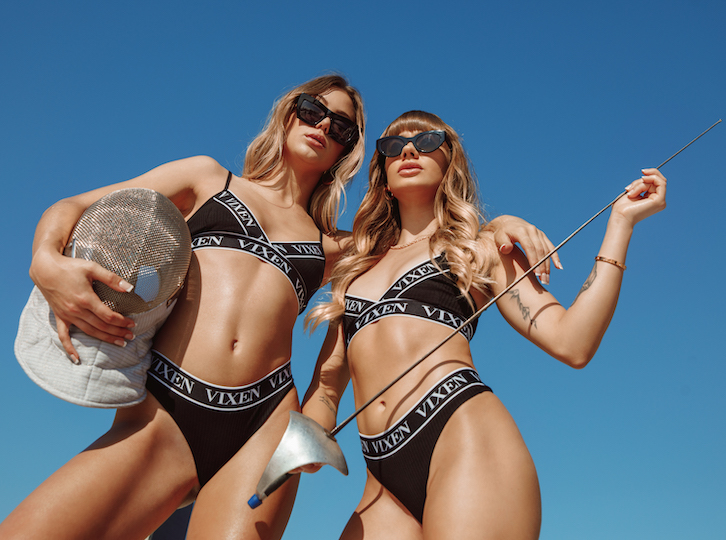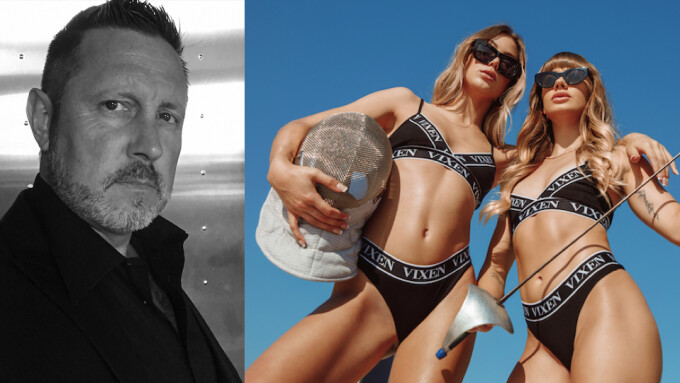LOS ANGELES — The world of adult entertainment was shocked earlier this week when Vixen Media Group (VMG) announced the signing of one of the industry’s most respected, longtime directors and producers, Brad Armstrong.
As far back as most industry players can remember, Armstrong’s name has been associated with Wicked Pictures, a company that signed him as an exclusive creative asset over 25 years ago.
“Which in porno years is more like 150!” a jovial Armstrong joked to XBIZ during an exclusive interview immediately following the announcement.
VMG announced the partnership with the acclaimed director as an exclusive, six-figure contract collaboration, starting with the fencing-themed “Love Triangle” (debuting today) and two other scenes shot during a trial period.
In fact, as Armstrong revealed to XBIZ, the exclusive contract — which formally begins in May and will involve 36 scenes over six months — is the final result of an increasingly supportive courtship between the parties that started, in one of the fortunate director’s signature phrases, “as luck would have it.”
In early 2020, Armstrong quietly left Wicked months before the company was sold to Gamma.
Much like a resigned veteran cop in a cliché buddy movie, when COVID struck Armstrong decided to hang up his directing hat, leave the industry and move to the Bahamas to spend the rest of his days at the beach.
As he tells it, he called an industry friend who is a certified divemaster to ask about renewing his diving credentials. The friend, who works at VMG, happened to mention Armstrong’s quite literal “sailing into the sunset” plan at work — and also the fact that the longtime “Wicked Boy” was technically a free agent.
VMG pulled him back in, first with a soft offer to act in a managerial capacity as a producing consultant, and then by setting up the three initial scenes to see if they liked working together.
The experience, Armstrong says, “couldn’t have been better.”
And so VMG acquired the services of one of the very few working directors in the industry with an uninterrupted track record of quality product — Armstrong has done it all, including a version back in the '90s of the now-signature glitzy Vixen house style — and a 360-degree understanding of adult film-making.
XBIZ: How did this new partnership with Vixen Media Group come about?
Brad Armstrong: When COVID started, I really didn’t see a future for the kind of movies I did because everything was going to have to be super-small footprint, no big scenes. I just found that it was going to be very difficult to make the kind of movies I had been making for the last 15-plus years.
At 55, I didn’t want to have to reinvent myself, so I pretty much had come to the realization that my career in porn was over. I’d been looking at houses in the Bahamas for the last five years, and I thought now was about as good a time as any to make it a reality.
So as luck would have it, I called Mark Nicholson, who’s a divemaster to re-up my PADI [Professional Association of Diving Instructors] certification and he told Mike Moz at Vixen, cause Mark also works at VMG, and Moz told [VMG owners] Steve and Mike and they reached out to me and we had a meeting, and they were excited at the prospect of maybe doing something together when they found out I was a free agent.
That must have been a shock, since most people in the industry associate you and your productions, even your partner Jessica Drake, so closely with Wicked.
I didn’t really think I had “left” Wicked — when COVID happened, I left the business. I never really imagined that I’d end my career with anybody else. I always thought I’d be a “Wicked Guy,” because I knew my career was starting to come to its sunset moment, being in 30-plus years and being under contract with Wicked for 25-plus.
Last spring was a strange time. Me and [Wicked founder and then owner] Steve [Orenstein] talked it out and we both understood what the COVID future was going to bring. It was definitely an amicable split, so it wasn’t really leaving him to work somewhere else: it was leaving the business.
Like I said, I was ready to pack my scuba gear and head down to the Bahamas, but, as luck would have it, things changed.
Let’s backtrack to your origins in the industry and your beginnings with Wicked, back in the post-“Boogie Nights”/pre-internet era of the 1990s and the video boom.
I did my first movie three decades ago, coming from Canada. This was even before AIDS tests. They picked me up at the airport and drove me right to a bowling alley in the middle of the night that they had rented. My first movie was “Bimbo Bowlers From Boston” [1990] — an epic title. It was the sequel of “Bimbo Bowlers From Buffalo” which had done so well. And the rest is history. That’s how it started, baby!

How did you end up in that San Fernando Valley bowling alley all the way from Canada?
The girl who got me into the business was Erica Boyer. I met her up in Canada — Playgirl magazine had done a “Men of Canada” special, so I had done my first layout, and I was so proud; I brought her the magazine. She was feature dancing up in Canada and I said, “I just shot my first magazine. Can you help me out?” So she hooked me up with [legendary industry photographer and Holly Randall's mother] Suze Randall. We did our first stills shoot and then I did “Bimbo Bowlers From Boston.”
Without Suze Randall there may not be a Brad Armstrong!
How did you transition into directing?
As I was [performing as] talent in movies, I thought, “There has to be a better day to do this,” because every movie was shot in one day and it was horrible. So I sold my house up in Canada to be my “nest egg” down here. I took $12,500 and me and [1990s star] Diana Lauren shot our first self-financed movie.
We did all the work and hired all our friends! Originally it was called “Of Kings and Queens” but as luck would have it, Vivid was just about to sign Diana and they said, “Oh, you got a movie in the can?” So they bought the movie and they renamed it “Checkmate” [1995] and that was my claim to fame: I suddenly became “the guy who sold the first movie he shot to Vivid!" Because back then that just didn’t happen.
So, the ultimate “Wicked Guy” almost became a “Vivid Boy”?
Yes, but a couple of months later, at the East Coast Video show, I’m sitting in a bar, waiting for people. Steve Orenstein is waiting at the bar waiting for other people. Steve had just started Wicked Pictures after being with Excitement.
After many lunches and trying to convince him into giving me a movie he gave me my first movie for him. I gave him the speech: “I just shot my first movie and Vivid bought it” and he said “Wha-aa-at?” A lot of Brent’s Deli lunches later, he gave me my first shot, which was “Wildcats” (1995) with Tera Hart [tagline: “She’ll Tera You Apart”] and basically each month I’d do a movie for each company: one month Vivid, one month Wicked, back-and-forth, back-and-forth.
Then, about a year in, at a Vegas awards show, they both wanted to announce a new contract boy so they both offered me a deal and I decided to take the Wicked deal, all-inclusive, talent, writing, art-directing, producing, directing, a one-man-show kind of thing.
Did you have any training in filmmaking?
No. It was all stuff I had learned from being on the set and watching all the mistakes that I was seeing. In my background I have a Commercial Art and Advertising degree, including photography. Although I had never used my field of choice up in Canada, it definitely paved the way to my career here because it gave me the eye for the aesthetics. I knew nothing about filmmaking [except] what I learned being on set. I still have never shot camera in my own career.
I always found that looking at the set narrowly through the viewfinder doesn’t give you the big picture, so I always like to be back a little bit and see what is what. I find it’s tough to look through that peephole and see the whole thing. Plus, I was running around doing wardrobe and sets and this-and-that — there’s only so many things you can do on your own.

Was it a big shock for you going from almost three decades at one company, to a completely different environment at VMG and directing for their Vixen brand?
More like joy! Compared to wearing every production hat at Wicked, here I do nothing! [Laughs] I don’t book talent, I don’t deal with COVID, I don’t book crew.
Seriously, that’s literally the only reason that I came back. I didn’t want to do all that for Wicked; I definitely don’t wanna do it for anyone else. But the VMG guys understood that and they made me a great offer.
All those years for Wicked, I was doing everything. My [production] year went from September to September. Every August, we’d sit down and go, “Okay, what do we wanna do?” I’d give them 10 or 12 movie pitches, he’d pick two, three, four, whatever that year was going to be and then I would go away and write the scripts and figure out what I was doing. Sometimes we’d have a meeting beforehand. But most of the time on that first day, I’d say, 'Okay— this one is between 75-85,000, this one is between 100-110,000" — whatever the budgets were going to be over the years.
At some point I didn’t even want to do that anymore and I’d say, ‘Okay, for these three movies, give me a budget for all them and if I’m a little high on one, I’d scrimp on the other.”
The first movie I produced for them shot in 1994, and I was under exclusive contract with Wicked from about 1997.
And during that time, like you often say, you’ve done every single type of scene.
Name one type of scene. Any type. Seriously — I’ve done it!
The funny thing is that since we announced the Vixen deal, everybody is all excited asking me if I’m going to have models coming out of helicopters. I did a helicopter landing 15 years ago! [laughs] There’s very little anybody can do today that I haven’t already done. In [the 2009 futuristic movie] “2040” we had a helicopter landing on the rooftop and [star] Kaylani getting out of it. Back when you had the budget.
And that’s what a lot of moviemaking is about. It’s your budget. Some directors have definitely done some amazing things with low budgets, but when you want to make a splash it costs money.
If I was going to stick around, if I was going to stay in adult, I didn’t want to go back to square one where I was scrimping and trying to make a movie with ever-diminishing budgets.
I was fine walking into the sunset and hanging out on the beach for the rest of my days and then VMG had another game plan for me.
In terms of production values, the VMG brands could be said to be the gold standard in the industry right now.
One of the beautiful things about being with the VMG lineup is that they have such a well-oiled machine and they have a staff to do each little job. It takes a lot of pressure off me. This has never been an old man’s game! [laughs] I no longer have to go to Costco the night before a shoot and buy all my supplies.
In adult when you’re a director you wear a lot of hats, so it’s a lot of pressure off your mind when some of those jobs are alleviated for you.
When you were at Wicked and you witnessed the rise of the Vixen brands as a competitor, what did you think of them?
They definitely had their marketing down to a fine science. They had some great-looking stuff and you’d definitely know who they were. They were definitely always on the top of the sales charts and they had a huge presence. They were, even early on, seen as one of the up-and-coming companies that really started to make headway.
Their cinematography, the cameras that they use are ridiculous good, $100,000 lenses and this-and-that. I think it will be fun playing with some of the cinematography advances that they’ve been utilizing. Their editing team is really spot-on. My first experience with the editing team was really positive, they did some really nice stuff.
What’s your creative input for the VMG scenes at this point, heading into the official beginning of the six-figure contract?
I still write all my stuff. When we move to the 36-scenes-in-six-months, we’ll split the duties with some of their writers because I just won’t have time to do all that writing.
We had our first pitch meeting last week when I gave them a list of 15 or 20 ideas. We’re going to pick from them and I’ll start writing some, they’ll start writing some and it should work out well. We’ll see.
I have a say in casting, but they definitely have a finite group of talent that are contracted or part of their Vixen Angels entourage. I can veto, but I haven’t decided to pull any casting yet, especially at the beginning, because I didn’t want, if anything went awry, for them to go, “Well, you cast the wrong person.” Now I can do that to them! “Hey, you guys picked her.” [laughs]
So far the talent they’ve given me has been great, everything has worked out very well.

What was the experience with the first test scene, “Love Triangle"?
The first thing we did was [the fencing scene with] Naomi Swann, Mick Blue and Avery Cristy, and they all did a great job.
It was a little bit out of their wheelhouse: it was a fencing academy, so we had fencing stunt doubles, and the girls did some fencing classes so they felt comfortable in their gear.
Mick played the strict Austrian fencing coach. Very stern and proper. It worked out great.
I created a fencing academy in their studio penthouse! When you’re at a place [VMG’s long-term studio in Los Angeles, rented full-time for their use during the pandemic] for that long, you have to art-direct it to change things up. I still get to do all the art direction — but with VMG, now I have helpers and a truck!
My second [aka First AD], Andy Appleton, he’s full-time there too, so I’m slowly but surely bringing my posse into the fold, so I have my homeboys working for me! Funnily enough, a lot of my crew over the years [are] actually working for them now. So it is kind of like “go home week” a little bit. Some of the guys I’ve worked with on my crews decades ago, they are all there. They all started as PAs and sound guys, then PMs and now they’ve made their way to Vixen.
The bottom line is: Vixen does really hire the upper-echelon of adult production.
What’s the thing you’re most looking forward to for this new venture?
The check. [laughs]
I told them, “At this point in my career, you’re basically paying me not to live on a beach. So, take that into account when you make your offer.”








